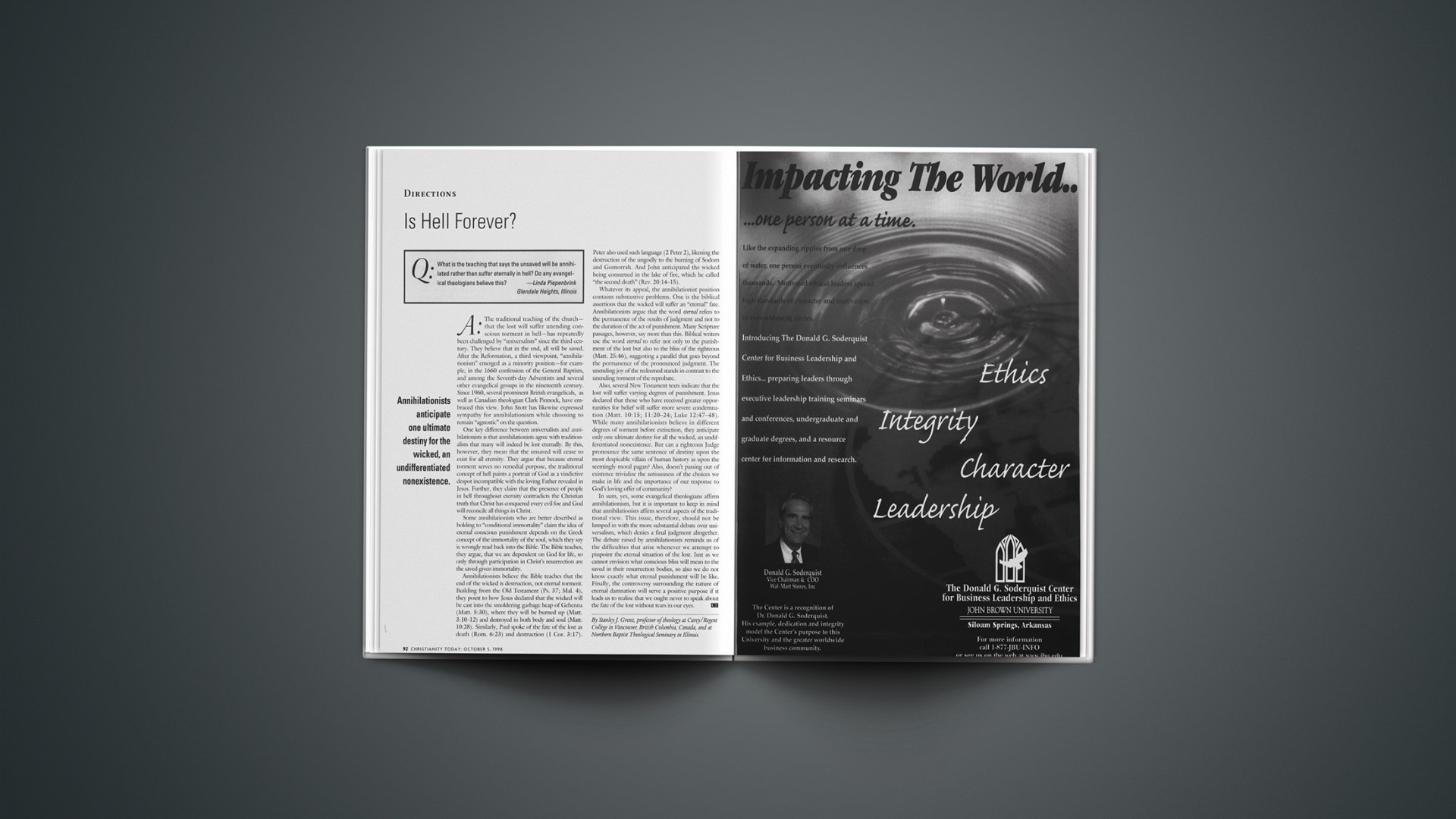Q: What is the teaching that says the unsaved will be annihilated rather than suffer eternally in hell? Do any evangelical theologians believe this?
—Linda Piepenbrink Glendale Heights, Illinois
A: The traditional teaching of the church—that the lost will suffer unending conscious torment in hell—has repeatedly been challenged by "universalists" since the third century. They believe that in the end, all will be saved. After the Reformation, a third viewpoint, "annihilationism" emerged as a minority position—for example, in the 1660 confession of the General Baptists, and among the Seventh-day Adventists and several other evangelical groups in the nineteenth century. Since 1960, several prominent British evangelicals, as well as Canadian theologian Clark Pinnock, have embraced this view. John Stott has likewise expressed sympathy for annihilationism while choosing to remain "agnostic" on the question.
One key difference between universalists and annihilationists is that annihilationists agree with traditionalists that many will indeed be lost eternally. By this, however, they mean that the unsaved will cease to exist for all eternity. They argue that because eternal torment serves no remedial purpose, the traditional concept of hell paints a portrait of God as a vindictive despot incompatible with the loving Father revealed in Jesus. Further, they claim that the presence of people in hell throughout eternity contradicts the Christian truth that Christ has conquered every evil foe and God will reconcile all things in Christ.
Some annihilationists who are better described as holding to "conditional immortality" claim the idea of eternal conscious punishment depends on the Greek concept of the immortality of the soul, which they say is wrongly read back into the Bible. The Bible teaches, they argue, that we are dependent on God for life, so only through participation in Christ's resurrection are the saved given immortality.
Annihilationists believe the Bible teaches that the end of the wicked is destruction, not eternal torment. Building from the Old Testament (Ps. 37; Mal. 4), they point to how Jesus declared that the wicked will be cast into the smoldering garbage heap of Gehenna (Matt. 5:30), where they will be burned up (Matt. 3:10-12) and destroyed in both body and soul (Matt. 10:28). Similarly, Paul spoke of the fate of the lost as death (Rom. 6:23) and destruction (1 Cor. 3:17). Peter also used such language (2 Peter 2), likening the destruction of the ungodly to the burning of Sodom and Gomorrah. And John anticipated the wicked being consumed in the lake of fire, which he called "the second death" (Rev. 20:14-15).
Whatever its appeal, the annihilationist position contains substantive problems. One is the biblical assertions that the wicked will suffer an "eternal" fate. Annihilationists argue that the word eternal refers to the permanence of the results of judgment and not to the duration of the act of punishment. Many Scripture passages, however, say more than this. Biblical writers use the word eternal to refer not only to the punishment of the lost but also to the bliss of the righteous (Matt. 25:46), suggesting a parallel that goes beyond the permanence of the pronounced judgment. The unending joy of the redeemed stands in contrast to the unending torment of the reprobate.
Also, several New Testament texts indicate that the lost will suffer varying degrees of punishment. Jesus declared that those who have received greater opportunities for belief will suffer more severe condemnation (Matt. 10:15; 11:20-24; Luke 12:47-48). While many annihilationists believe in different degrees of torment before extinction, they anticipate only one ultimate destiny for all the wicked, an undifferentiated nonexistence. But can a righteous Judge pronounce the same sentence of destiny upon the most despicable villain of human history as upon the seemingly moral pagan? Also, doesn't passing out of existence trivialize the seriousness of the choices we make in life and the importance of our response to God's loving offer of community?
In sum, yes, some evangelical theologians affirm annihilationism, but it is important to keep in mind that annihilationists affirm several aspects of the traditional view. This issue, therefore, should not be lumped in with the more substantial debate over universalism, which denies a final judgment altogether. The debate raised by annihilationists reminds us of the difficulties that arise whenever we attempt to pinpoint the eternal situation of the lost. Just as we cannot envision what conscious bliss will mean to the saved in their resurrection bodies, so also we do not know exactly what eternal punishment will be like. Finally, the controversy surrounding the nature of eternal damnation will serve a positive purpose if it leads us to realize that we ought never to speak about the fate of the lost without tears in our eyes.
By Stanley J. Grenz, professor of theology at Carey/Regent College in Vancouver, British Columbia, Canada, and at Northern Baptist Theological Seminary in Illinois.
Copyright © 1998 Christianity Today. Click for reprint information.










